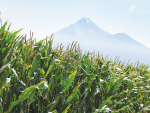Agcarm supports the United Nations Food and Agriculture Organization (FAO) in recognising World Food Day on October 16.
The theme for the day is ‘Climate is changing. Food and agriculture must too’. One of the biggest challenges of climate change is food security. At the same time, the global population is expected to reach 9.6 billion by 2050.
Crop protection products play a vital role in controlling the pests and diseases that threaten our food supply. They enable farmers to grow an abundant supply of healthy produce in a safe manner and at an affordable price by reducing crop losses and increasing yields.
Agcarm chief executive Mark Ross says, “Without plant science innovations, global crop yields would be decimated."
FAO estimates that agricultural production needs to rise by 60% to feed the growing population and asks that food be grown sustainably – ‘by adopting practices that produce more with less in the same area of land and by reducing food losses’. The organisation also estimates that farmers lose up to 40% of their crops due to pests and diseases.
“Since the introduction of pesticides, farmers have been able to produce bigger crops on less land, increasing crop productivity by up to 50%. Agricultural productivity ensures a plentiful supply of fresh produce is available to ensure a healthy population,” says Ross.
As the population grows, arable land decreases, and the impact of climate change begins to be felt, it is more important than ever to provide farmers with the tools needed to produce more using fewer natural resources.
“We need to ensure that agriculture becomes even more efficient in terms of energy, land and water use, with a smaller environmental footprint,” adds Ross.
Farmers contend with 30,000 species of weeds that fight with food crops for space, water and soil nutrients. There are also more than 10,000 species of plant-eating insects and 50,000 disease causing fungi.
The plant science industry continues to commit itself to innovation in finding solutions to further increase the sustainability of farming practices.











